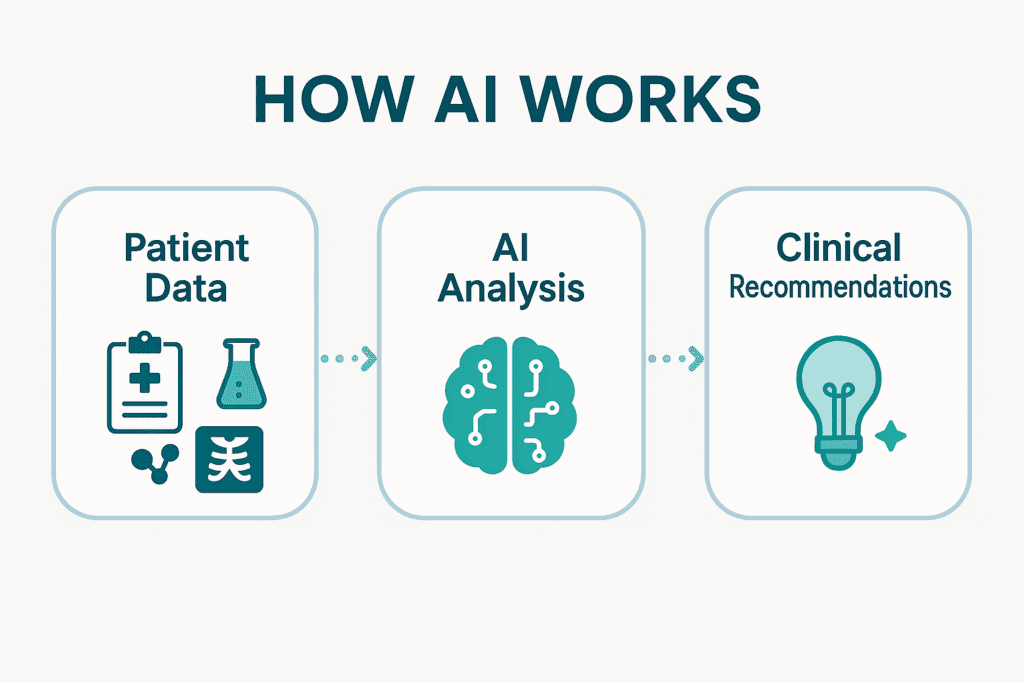If you’re considering modernizing your practice with artificial intelligence or evaluating AI clinical decision support as part of a potential sale or acquisition, you’re asking the right questions at the right time.
66% of physicians are now using AI tools in 2024—nearly doubling from 38% in 2023. These systems have moved from experimental technology to essential practice infrastructure.
Whether you’re curious about what AI clinical decision support could mean for your practice’s efficiency and patient outcomes, or you’re ready to understand how these systems could impact your practice’s valuation, this guide will walk you through everything you need to know.
What Is an AI Medical Decision Support System?

Think of AI-driven clinical decision support systems as having a highly knowledgeable medical consultant available 24/7, one who has reviewed millions of patient cases and can instantly recall the latest medical literature. These systems analyze your patient data in real-time and provide evidence-based recommendations to support your clinical decisions.
Unlike traditional computer systems that follow rigid rules, AI medical decision support systems learn from vast amounts of clinical data. They can identify patterns you might miss, flag potential drug interactions before you prescribe, and even predict which patients are at risk for complications—all while you’re reviewing their chart.
Here’s what makes them different from older systems: Instead of simply alerting you when a lab value falls outside normal ranges, an AI system might analyze that same lab result alongside the patient’s medical history, current medications, recent vital signs, and similar cases to provide contextualized guidance.
For instance, it might suggest that slightly elevated creatinine in a 75-year-old diabetic patient warrants immediate attention, while the same level in a healthy 25-year-old athlete might be normal.
The technology has matured significantly. The FDA has now approved over 950 AI algorithms for clinical use, with 107 new approvals in 2024 alone. These aren’t experimental tools—they’re proven systems helping practices deliver better care while improving operational efficiency.
Bottom Line
AI clinical decision support systems don’t replace your clinical judgment—they enhance it with data-driven insights you couldn’t possibly process manually. Think of them as having a medical consultant who never sleeps and has reviewed millions of cases.
How Do AI-Driven Decision Support Systems Differ from Traditional Healthcare Technology?
AI-driven clinical decision support systems represent a fundamental shift from traditional healthcare technology. While older clinical decision support systems in healthcare relied on pre-programmed rules (like “alert if patient is allergic to prescribed medication”), AI systems use machine learning to continuously improve their recommendations based on outcomes data.
The core difference lies in adaptability. Traditional systems are static—they follow the same rules regardless of context. AI systems learn and evolve. They might initially recommend standard diabetes management protocols, but after analyzing thousands of patient outcomes in your specific practice, they begin tailoring recommendations to your patient population’s unique characteristics.
We often see practice owners initially skeptical about AI recommendations, much like when electronic health records first emerged. However, just as EHRs became indispensable despite initial resistance, AI clinical decision support is rapidly becoming essential infrastructure.
The key is understanding that these systems don’t replace your clinical judgment—they enhance it with data-driven insights you couldn’t possibly process manually.
A Practical Example
Your traditional system might alert you that a patient’s blood pressure medication needs adjustment based on their last reading.
An AI system analyzes the same patient’s BP trends over six months, considers their adherence patterns (tracked through pharmacy refills), factors in their recent lab work, and suggests not just medication adjustment but optimal timing for the next appointment based on their response patterns.
It’s the difference between reactive alerts and proactive clinical strategy.
Does CDSS Use AI and How Has It Evolved?
The short answer is yes—modern clinical decision support systems in healthcare increasingly incorporate AI, though not all CDSS are AI-powered. This distinction matters more than you might think, especially if you’re evaluating systems for your practice or considering how technology impacts practice valuation.
Traditional CDSS operates on “if-then” logic: If patient age is over 65 AND creatinine is above 1.5, then suggest dose adjustment. These rule-based systems serve important functions but have significant limitations. They generate numerous alerts—often irrelevant ones—leading to the “alert fatigue” problem where clinicians begin ignoring system warnings.
AI-powered CDSS represents the next generation. These systems use machine learning algorithms to:
- Learn from patterns in your specific patient population
- Reduce false alerts by understanding clinical context
- Provide probability-based recommendations rather than binary warnings
- Adapt to your practice patterns and preferences over time
Why This Evolution Matters for Practice Owners
From a practice management perspective, this evolution matters significantly. AI-powered systems show measurable improvements in efficiency—clinical search times reduced by 66-75% in implemented systems—while traditional CDSS often adds administrative burden without proportional benefits.
Valuation Impact
AI-enhanced CDSS represents a competitive advantage when positioning your practice for sale. These systems demonstrate your commitment to modern, evidence-based care delivery—something quality buyers specifically look for.
If you’re considering system upgrades or potential buyers are evaluating your practice’s technology infrastructure, AI-enhanced CDSS represents a competitive advantage. These systems not only improve clinical outcomes but demonstrate your practice’s commitment to modern, evidence-based care delivery.
What Are the Most Practical AI Use Cases in Healthcare for Your Practice?
AI use cases in healthcare extend far beyond the futuristic scenarios you might imagine. Today’s applications deliver immediate, practical benefits that directly impact your practice’s efficiency and patient outcomes.
| AI Application | Practice Impact | Typical ROI Timeline |
| Diagnostic Support | 94% accuracy in lung nodule detection vs 65% human accuracy | 3-6 months |
| Medication Management | 30-40% reduction in adverse drug events | 1-3 months |
| Risk Prediction | Early sepsis detection, reduced readmissions | 6-12 months |
| Administrative Tasks | 66-75% reduction in clinical search time | Immediate |
Diagnostic Support
Diagnostic support represents the most mature application. AI systems now match or exceed human performance in specific areas—achieving 94% accuracy in detecting lung nodules versus 65% for human radiologists.
For your practice, this means faster, more accurate diagnoses, particularly valuable if you’re in primary care and need to make referral decisions or if you’re in a specialty practice dealing with complex imaging interpretation.
Medication Management
Medication management offers perhaps the most immediate return on investment. AI systems monitor drug interactions across 18,000+ known combinations, adjust dosing for patients with kidney disease, and track adherence patterns.
We’ve seen practices reduce adverse drug events by 30-40% after implementing comprehensive medication management AI—a significant liability reduction with measurable cost savings.
Risk Prediction
Risk prediction capabilities are transforming chronic disease management. AI systems can predict heart failure exacerbations, identify sepsis risk hours before traditional methods, and flag patients likely to require emergency care.
For practice owners, this translates to fewer after-hours calls, reduced hospital readmissions (important for value-based contracts), and improved patient satisfaction.
Administrative Efficiency
Administrative efficiency improvements often provide the quickest payback. AI-powered documentation systems reduce note-taking time, automated coding suggestions improve billing accuracy, and intelligent scheduling systems optimize appointment allocation.
TidalHealth Peninsula Regional reported reducing clinical search time from 3-4 minutes to less than 1 minute—multiply that time savings across your daily patient volume, and the efficiency gains become substantial.
Risk & Liability Reduction
Practices implementing comprehensive AI medication management see 30-40% reduction in adverse drug events. This isn’t just better patient care—it’s significant liability protection with measurable cost savings.
Which AI Clinical Decision Support System Is Best for Your Practice?
Asking “which is the best AI for clinical decision support” is like asking which is the best diagnostic tool—the answer depends entirely on your practice’s specific needs, patient population, and existing technology infrastructure.
Leading AI Clinical Decision Support Systems
| System | Best For | Key Strength | Integration |
| Epic AI Tools | Epic EHR users | Seamless workflow integration | Native Epic integration |
| IBM Micromedex with Watson | Medication management | 66-75% search time reduction | Multiple EHR systems |
| Aidoc | Radiology-heavy practices | 13 FDA-cleared algorithms | 1,000+ medical centers |
| Microsoft Healthcare AI | Complex diagnostics | 59% vs 33% human diagnostic accuracy | Research-level performance |
Epic Systems dominates the market through EHR integration, with 92% of clinicians preferring CDSS embedded directly in their existing Epic systems. If you’re already using Epic, their AI tools offer seamless workflow integration, though functionality may be more limited compared to specialized AI vendors.
IBM Micromedex with Watson has proven particularly effective for medication-related decision support. TidalHealth’s implementation demonstrated remarkable efficiency gains, reducing drug information search time by 66-75%. This system excels if medication management represents a significant portion of your decision support needs.
Aidoc leads in radiology AI, deployed across over 1,000 medical centers worldwide with 13 FDA-cleared algorithms. If your practice involves significant imaging interpretation—whether you’re reading your own studies or making decisions based on radiology reports—Aidoc’s proven track record makes it worth serious consideration.
Microsoft’s healthcare AI has shown impressive diagnostic capabilities, correctly diagnosing 59% of complex cases compared to 33% for human physicians in recent studies. However, this represents research-level performance that may not translate directly to your practice setting.
Making Your Selection
The honest answer is that the “best” system depends on your specific circumstances. We recommend evaluating systems based on:
- Integration with your existing EHR
- Specific clinical areas where you need decision support
- Practice size and technical support capabilities
- Budget for implementation and ongoing costs
Many practices benefit from starting with one focused application (like medication management) rather than attempting comprehensive AI implementation initially.
Additional Resources for AI Decision Support Research
When evaluating AI clinical decision support systems, consider these authoritative resources:
- FDA AI/ML Software Guidance – Official regulatory guidance for AI medical devices
- American Medical Association AI Code of Medical Ethics – Ethical considerations for AI implementation
- Healthcare Information Management Systems Society (HIMSS) AI Resources – Implementation best practices and case studies
- Agency for Healthcare Research and Quality (AHRQ) Clinical Decision Support – Evidence-based implementation guidance
Quick Tip
Start with lower-risk applications like medication management or administrative efficiency tools. This allows you to develop AI governance policies and gain experience before relying on AI for critical patient care decisions.
How Do HIPAA Regulations Affect Your AI Implementation?
HIPAA compliance represents one of the most critical considerations when implementing healthcare decision support systems, and understanding these requirements protects both your patients and your practice from significant liability exposure.
The fundamental challenge with AI systems is that they require access to large amounts of patient data to function effectively. This creates unique privacy and security considerations that traditional medical software doesn’t face.
Data Processing and Storage Requirements
AI vendors must demonstrate comprehensive HIPAA compliance for all data handling processes. Unlike traditional software that might only access specific data fields, AI systems often require access to complete patient records, imaging studies, and laboratory results to provide accurate recommendations.
You’ll need written Business Associate Agreements (BAAs) with any AI vendor, but these agreements must address the specific ways AI systems process and analyze patient data.
Cloud Computing Considerations
These are particularly complex with AI systems, which often rely on cloud-based processing power. While HIPAA permits cloud storage and processing with appropriate safeguards, you must verify that your AI vendor’s cloud infrastructure meets all HIPAA technical safeguards requirements.
This includes encryption at rest and in transit, audit logging, and access controls.
HIPAA Compliance Resources
For comprehensive HIPAA compliance guidance specific to AI implementations:
- HHS HIPAA Security Rule – Technical safeguards requirements
- NIST Cybersecurity Framework – Security implementation best practices
- Healthcare Data Protection Best Practices – Health IT privacy and security fundamentals
De-identification Standards
De-identification becomes crucial when AI vendors want to use your practice’s data to improve their algorithms. While properly de-identified health information isn’t subject to HIPAA restrictions, the de-identification process for AI training data requires careful attention to ensure patient privacy protection.
Practical Impact on Your Practice
The practical impact on your practice is that HIPAA compliance adds complexity and cost to AI implementation, but it doesn’t prevent it. Most established AI vendors have invested heavily in HIPAA compliance infrastructure. However, you’ll need to conduct more thorough due diligence on AI vendors compared to traditional software providers.
We strongly recommend involving your practice’s legal counsel in AI vendor evaluation, particularly if you’re considering systems that will handle sensitive patient data or if you’re planning to participate in AI research or algorithm training programs.
The treating physician remains ultimately responsible for all clinical decisions, regardless of AI input. You cannot rely solely on AI recommendations and can be held liable for failing to exercise independent clinical judgment.
What Liability Issues Should You Consider with AI Clinical Decision Support?
The liability landscape surrounding AI-driven clinical decision support systems represents new territory for healthcare law, and understanding these risks is essential for protecting your practice and making informed implementation decisions.
Professional Liability Considerations
Professional liability centers on the fundamental question: Who is responsible when an AI system provides incorrect recommendations? Currently, legal precedent establishes that the treating physician remains ultimately responsible for all clinical decisions, regardless of AI input.
This means you cannot rely solely on AI recommendations—you must exercise independent clinical judgment and can be held liable for failing to do so.
However, liability also extends to situations where you ignore appropriate AI warnings. If an AI system correctly identifies a drug interaction and you proceed without documentation of your clinical reasoning, you could face increased liability exposure.
The key is treating AI recommendations as you would consultant opinions—valuable input that requires your professional interpretation and decision-making.
Vendor Liability and Indemnification
Vendor liability issues are evolving rapidly. Currently, most AI vendors disclaim liability for clinical outcomes resulting from their recommendations. This places the liability burden squarely on your practice.
When evaluating AI systems, pay careful attention to vendor liability provisions and consider whether your malpractice insurance adequately covers AI-assisted care decisions.
Documentation Requirements
Documentation becomes more complex with AI systems. Best practices emerging from early adopters suggest documenting when AI recommendations influence your decisions and when you choose to disregard AI advice.
This documentation serves as evidence that you exercised appropriate clinical judgment while leveraging available decision support tools.
Regulatory Compliance Risk
Regulatory compliance represents an additional liability consideration. While the FDA approves AI algorithms, post-market surveillance requirements mean that algorithm performance can change over time.
You need assurance that your AI vendor maintains regulatory compliance and notifies users of any performance changes or safety alerts.
Risk Management Strategy
From a practical risk management perspective, we recommend implementing AI systems gradually, starting with lower-risk applications like administrative efficiency tools before moving to high-stakes clinical decision support.
This approach allows you to develop AI governance policies and gain experience with these systems before relying on them for critical patient care decisions.
Best Practice
Document when AI recommendations influence your decisions AND when you choose to disregard AI advice. This serves as evidence that you exercised appropriate clinical judgment while leveraging available decision support tools.
Is AI Clinical Decision Support Right for Your Practice?
Understanding AI-driven clinical decision support systems positions you to make informed decisions about technology investments that could significantly impact your practice’s efficiency, patient outcomes, and ultimately, its value.
The data shows clear momentum toward AI adoption in healthcare—from 38% of physicians in 2023 to 66% in 2024. This isn’t just a trend; it’s a fundamental shift in how modern medical practices operate.
Early adopters report measurable benefits: reduced clinical search time, fewer medication errors, improved diagnostic accuracy, and enhanced workflow efficiency.
The investment in AI clinical decision support systems represents not just operational improvement but competitive positioning. Practices with modern, AI-enhanced workflows demonstrate higher valuations and attract quality buyers.
Implementation Strategy
However, successful AI implementation requires careful planning. Start by identifying your practice’s specific pain points—whether that’s medication management, diagnostic support, documentation efficiency, or patient risk assessment.
Choose systems that integrate with your existing EHR and workflow rather than requiring completely new processes. Ensure your selected vendor provides comprehensive HIPAA compliance and appropriate liability protections.
Strategic Planning Resources
For comprehensive guidance on technology integration and strategic planning:
- Practice Technology Assessment Guide – Evaluate your current technology infrastructure
- M&A Glossary – Understanding key terms in healthcare transactions
- How We Work – Our approach to healthcare advisory services
Competitive Positioning
The investment in AI clinical decision support systems increasingly represents not just operational improvement but competitive positioning. Practices with modern, efficient AI-enhanced workflows demonstrate higher valuations and attract quality buyers who recognize the operational advantages these systems provide.
Whether you’re implementing AI systems to improve your current practice operations or positioning your practice for a future sale, understanding these technologies and their implications ensures you’re making decisions that benefit both your patients and your business objectives.
If you’d like to discuss how AI implementation might impact your practice’s valuation or operational efficiency as part of your strategic planning, we’re always happy to help provide guidance tailored to your specific situation. Contact us here.
Is your practice ready for AI?
Find out now with our worksheet. Download now.



